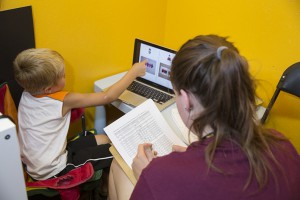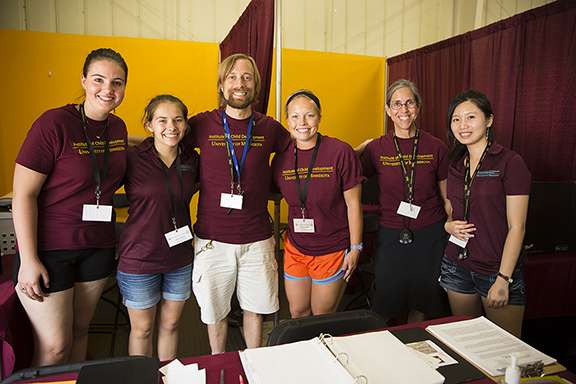Whether we realize it or not, we use numbers in our work and play every day. We plan schedules, estimate distances, keep track of sport team statistics, play cards, balance bank accounts, and estimate total costs as we shop. Effortful or automatic, our reliance on numbers is pervasive.

Children rely on numbers, too. They readily identify which shelf has more books and whether you’ve added or subtracted cookies from their plate. This intuitive “number sense” is linked to the formal symbols—words, digits, notations—that children learn from adults.
Although mathematics is more than numbers, our facility with numbers is an important foundation for mathematics, which is so important for many aspects of our lives.
Before learning formal math, children use number words quite effectively, so adults may assume that this number use and counting means that children “know” their numbers. But what does it really mean to know your numbers?
Developmental scientists have long demonstrated that knowledge of number properties emerges gradually. For instance, children “count” in the correct sequence before they understand that counting systematically reveals how many items are in a set. They recognize addition and subtraction long before they learn formal arithmetic. Their different levels of number knowledge reflect stages of development but may also reflect learning opportunities and the variation seen across children that psychologists refer to as individual differences.
All three of these influences—developmental effects, learning experiences, and individual differences—affect children’s mathematical thinking, so we focus on all three in our research at the Math and Numeracy Lab in the Institute of Child Development. Our primary research explores number and math skills that children acquire before school, how children learn formal mathematics once they begin school, why some children have difficulty learning school mathematics, and when such difficulties reflect a potential learning disability.
Kindergarten number skills matter
In one of our current projects, we are probing deeper into young children’s emerging number concepts. We want to know if the way that preschool children interpret and use number words is important for their later mathematical learning. Since number skills at kindergarten predict math achievement several years later, we want to know if the same is true for number skills before kindergarten and to identify which number skills are most revealing of important differences in early number knowledge.
Children entering kindergarten have number skills and knowledge that support learning mathematics, so why should we worry about number skills before kindergarten? One reason is that children differ from each other in the depth or automaticity of their numerical knowledge and skills, and these differences predict the likelihood of lifelong struggles with mathematics. At kindergarten, children differ in their abilities to count, identify which of two numbers or sets of objects is bigger, name digits, or add or subtract small quantities.
But don’t these differences disappear with schooling? Unfortunately, they may not. By third grade, number knowledge difficulties may surface as place-value errors. Later they may impact how readily children name decimals or fractions. We have found that even in high school, differences in mathematics achievement levels are linked to individual differences in number processing. High school students with higher mathematics achievement scores can evaluate the accuracy of simple arithmetic statements relatively effortlessly, while high school students with lower mathematics achievement scores appear to engage effortful numerical processing during this task.
Since number skills are important from kindergarten to high school, and since early number skills predict later mathematics achievement, we should attend to the development of mathematical thinking in early childhood.

Currently, we are studying how children interpret number words in different contexts. Children may know that 4 is a bigger number than 2, for example, but will they recognize that 4 apples might not be more than 2 bags of apples? Do children differ in their awareness of numbers in the environment? If yes, do these differences matter?—that is, do they influence the trajectory of their early mathematics learning?
In our studies, a focus on development and attention to individual differences prompt us to include adults. This allows us to identify individual differences in aspects of number beyond childhood and the range of these individual differences in adulthood.
Next steps for research
Findings from our ongoing number concepts research set the stage for three related longitudinal studies we hope to conduct soon.
In the first study, we will focus on whether the individual differences we identify in early number concepts are influenced by other cognitive domains, such as language or executive functions, and if they are associated with later mathematics learning.
Through a second, related study we aim to test ways to diminish differences in early number concepts before kindergarten—in other words, how to prepare all children for early mathematics.
Through a third study, we will explore how to engage caregivers in this quest to boost children’s mathematical thinking.
In addition to these research goals, we strive to bring research findings to early childhood teachers and caregivers, an effort that we have already begun through the Center for Early Education and Development (CEED). Our goal is to dramatically expand efforts to share knowledge of early mathematics to children’s first educators—parents and other care providers, and preschool and prekindergarten teachers—throughout Minnesota.
In this way, we can help children build a solid foundation for their future mathematics, allowing them to experience the benefits associated with learning and appreciating mathematics.
Michèle Mazzocco is a professor in the Institute of Child Development and research director for the Center for Early Education and Development (CEED).
By Michèle Mazzocco | Photos by Greg Helgeson | Winter 2015